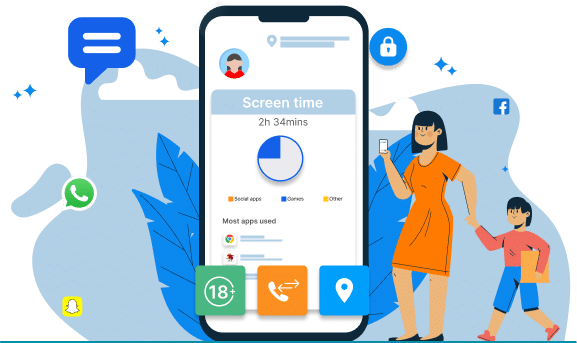
Teen dating has changed a lot since the days of handwritten notes and meetups after school. These days, it starts and grows on smartphones, especially during phone calls. This change has made it harder for parents to keep up with their teens’ feelings and friends.
To get around this new world, you must learn digital parenting and how call tracking apps help parents. These tools can inform parents about call trends, lengths, and how often their teens talk to people. They help parents spot possible red flags without getting in the way of privacy.
Parents can support their child’s mental safety and work on identifying risky communication by learning to monitor teen dating communication. They can do this while encouraging confidence, open communication, and smart digital behavior in a quickly changing world.
How Teen Dating Has Shifted to Phone-Based Conversations
These days, teens who are dating often start talking on their phones or rely on them a lot. Calls are more private than texts, so you can have long, private conversations without leaving as much of a digital trail as chat logs do.
Teenagers can have talks late at night now that they have easier access to cell phones. They might stay in touch with new friends or talk to people they’ve never met. Some people might use hidden calling cards or numbers they don’t know. Parents can’t always tell who is talking to their child to identify risky communication because of these things.
Parents must understand how important calls have become in influencing their teens’ emotional and social development in order to monitor teen dating communication.
Why Parents Need Awareness, Not Control
Teenage years are a time of figuring out who you are and exploring your feelings. These things leave them open to peer pressure, misunderstandings, or interactions that aren’t good. Of course, parental participation is essential, but not if it means constant supervision or strict rules.
Emotional safety, honest conversations, and reliable role models are what young people require. It is essential to notice the early signs of controlling behavior, such as too many calls or improper conversations. Learning how parents can monitor teen calls can help in fostering awareness and security. These methods should be focused more on security and less on invasion of privacy.
Parents can spot possible red flags by using a phone call monitoring app like TiSPY for teenagers. Some examples of such red flags include getting a lot of calls after midnight or talking to older people over and over again. After becoming more aware, parents can make use of it to start discussions that are encouraging.
What Call Tracking Apps Offer Parents Today
Parents can get helpful information from call tracking apps that put emotional safety and responsible phone use first. With these tools, parents can look at full call logs, including timestamps, call lengths, and full contact names. Parents can find many different trends by learning how to track call activity. These could include many calls late at night or from numbers you don’t know, which are often early warning signs of possible problems.
Without breaking trust, this amount of openness promotes relationship awareness. Parents don’t have to guess; they have access to factual, polite information that can help them have conversations about how to connect with others in a healthy way. These apps can be helpful tools for building openness and setting safe boundaries when used wisely. It can help kids grow up in a safe and well-informed place.
Teen Phone Safety Tips Every Parent Should Follow
Parents should set rules for their kids, even if they use tracking apps. These rules should encourage safe internet use and responsible phone use. The following teen phone safety tips can help:
- Set Transparent Expectations: Discuss call time limits and the best phone use times.
- Look for Red Flags: Mood swings after calls or keeping call partners a secret are red flags.
- Encourage Check-Ins: Talk about your friends and dating hobbies regularly.
- Encourage Online Responsibility: Educate children regarding threats to privacy and giving consent.
How to Build Trust While Staying Informed
Rather than attempting to control their kids, parents should create a safe and secure environment for them. Sharing and respecting each other are the first ways of developing trust.
- Start by being honest with each other: Before you use any call tracking tools, talk to your teen about your worries and plans.
- Stress advice over punishment: Tell them that the goal is not to punish them but to help them grow emotionally.
- Ask for consent: Include them in the decision-making process and value their input to reinforce digital duty.
- Aim for healthy communication: Let them know they don’t have to be afraid to talk to you about it.
- Encourage responsible phone use: Talk about what it means to communicate safely and politely.
When parents emphasize building openness within the family, it increases trust over control.
Conclusion
Parents need better tools to stay aware and help their teens as their relationships change in the digital age. Call tracking apps like TiSPY help parents to monitor teen dating communication while maintaining privacy.
It’s not about controlling but ensuring everyone is safe through relationship awareness, healthy communication, and deep talks. By combining these resources with trust and direction, parents may help their teens become responsible digital citizens.




